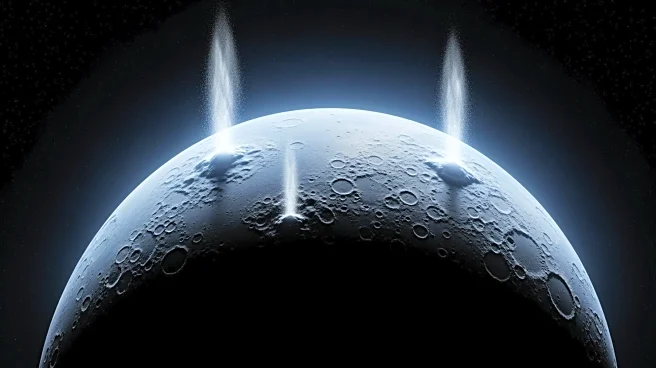What's Happening?
Recent scientific analysis has suggested that Saturn's moon Enceladus possesses the necessary conditions to support life. The Cassini spacecraft, which conducted multiple flybys of Enceladus, collected samples that indicate the presence of liquid water,
a source of energy, and essential molecules required for life. Enceladus, known for its bright icy surface, has a subsurface ocean beneath its thick ice shell, which is believed to be a potential habitat for life. The moon's eruptions of gas and icy particles into space allowed Cassini to gather samples for analysis. The latest study, published on October 1, highlights the discovery of organic molecules that could lead to complex organic compounds, essential for life. Although these findings do not confirm the presence of life, they suggest that Enceladus has the potential for life-forming chemical reactions.
Why It's Important?
The discovery of life-supporting conditions on Enceladus is significant for the scientific community and the broader understanding of life beyond Earth. It opens up possibilities for future missions to explore Saturn's moons further, potentially leading to groundbreaking discoveries about extraterrestrial life. The presence of organic molecules on Enceladus could provide insights into the origins of life and the conditions necessary for life to thrive. This research could influence future space exploration priorities and funding, as scientists may advocate for new missions to study Enceladus and similar celestial bodies. The findings also contribute to the ongoing debate about the existence of life elsewhere in the universe, challenging our understanding of life's potential habitats.
What's Next?
Following the Cassini mission's conclusion in 2017, scientists are considering sending another probe to Saturn's moons to continue the exploration of Enceladus and its potential for hosting life. The data collected by Cassini is still being analyzed, and future missions could be equipped with advanced technology specifically designed to detect biosignatures and analyze samples more effectively. The scientific community may push for international collaboration to fund and develop new missions, aiming to uncover more about Enceladus and other moons with subsurface oceans. These efforts could lead to significant advancements in astrobiology and our understanding of life in the universe.
Beyond the Headlines
The implications of finding life-supporting conditions on Enceladus extend beyond scientific discovery. It raises ethical questions about the potential contamination of extraterrestrial environments and the responsibility of space agencies to preserve these habitats. The findings also challenge cultural perceptions of life and its uniqueness, potentially influencing philosophical and theological discussions about humanity's place in the universe. Long-term, this research could shift the focus of space exploration from Mars to other celestial bodies, diversifying the targets of future missions and expanding our search for life.
















